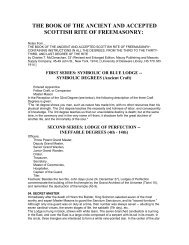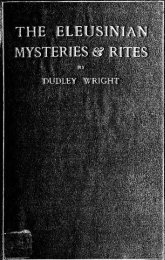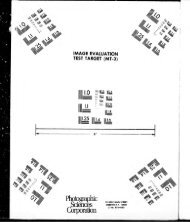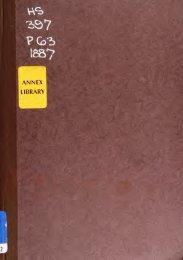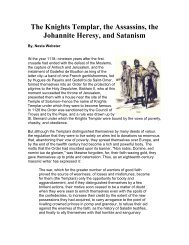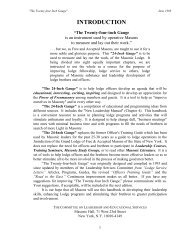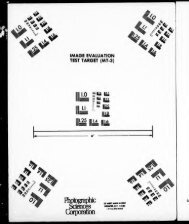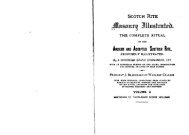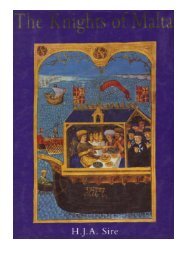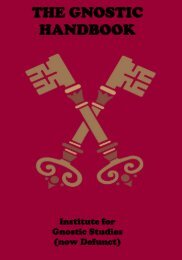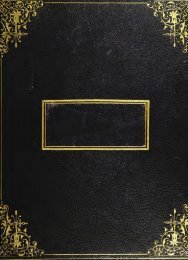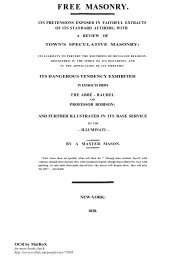The History of Initiation - The Masonic Trowel
The History of Initiation - The Masonic Trowel
The History of Initiation - The Masonic Trowel
You also want an ePaper? Increase the reach of your titles
YUMPU automatically turns print PDFs into web optimized ePapers that Google loves.
116 HISTORY OF INITIATION.<br />
great body <strong>of</strong> Persian Scythians, whom the Greeks call<br />
Phenicians." <strong>The</strong>se opinions, collected by Mr. Hutch-<br />
inson, 15 can only prove that the nations agreed as to the<br />
practice<br />
<strong>of</strong> similar rites and ceremonies in the administration<br />
<strong>of</strong> religious worship for the Druids nourished in<br />
;<br />
Gaul and Britain, at least coeval with the planting <strong>of</strong><br />
many other nations, from which theorists have conjectured<br />
they might derive their original. 16<br />
Besides, these<br />
several people paid their devotions to different objects<br />
<strong>of</strong> worship; some were Sabians, and worshipped the<br />
host <strong>of</strong> heaven; others were magians, and confined<br />
their adoration to the solar fire two sects which ;<br />
always<br />
entertained the utmost contempt and hatred for each<br />
other's principles. 17 <strong>The</strong> testimonies, however, are amply<br />
sufficient to point out the analogy which subsisted in<br />
early times between the mysterious institutions <strong>of</strong> those<br />
15 Hist. Cumb., vol. i., 247.<br />
16 <strong>The</strong> first people who settled in Britain are said to have been led<br />
hither by Gomer, or some <strong>of</strong> his immediate descendants. (Turn.<br />
Angl. Sax., vol. i., p. 14.) If this be true, Britain received its population<br />
very soon after the Dispersion. <strong>The</strong> continent <strong>of</strong> Europe was<br />
peopled by the children <strong>of</strong> Dodanim, the grandson <strong>of</strong> Japheth and<br />
;<br />
by the operation <strong>of</strong> some or all <strong>of</strong> the causes resulting from a redundant<br />
population, the surplus being pressed to the sea coast <strong>of</strong> Gaul, our<br />
island was discovered in the distance, and a wandering tribe called<br />
the Hord Gaeli, who, on a casual visit, named it the Watergirt Green<br />
Plot, according to the testimony <strong>of</strong> the Welsh Bards having been<br />
tempted to take possession <strong>of</strong> it, found it so rich and beautiful that<br />
they changed the name to the Honey Island. I have the authority<br />
<strong>of</strong> Sammes for saying that this took place about A. M. 1910, the<br />
exact period when Ninus founded the kingdom <strong>of</strong> Assyria, or a little<br />
before Abraham first went into the land <strong>of</strong> Canaan. This tribe was<br />
subsequently dispossessed by a stronger party, under the command<br />
<strong>of</strong> Prydain, the son <strong>of</strong> Aedd the Great, who, collecting together some<br />
scattered tribes <strong>of</strong> the Cymri who were friendly to his<br />
interests,<br />
made an inroad upon the island, and took an undisputed possession.<br />
and he sub-<br />
Its name was once more changed to Prydain or Britain ;<br />
divided it into three parts, and placed in them as viceroys three <strong>of</strong><br />
his most distinguished followers, at the head <strong>of</strong> their respective<br />
tribes. First the Cymri, who came with Hu the mighty. <strong>The</strong>se<br />
introduced arts and civilization, and inhabited Wales. <strong>The</strong> second<br />
tribe who settled in the island were the Lloegrians. <strong>The</strong>y came from<br />
Gwasgwyn. and were descended from the primitive nation <strong>of</strong> the<br />
Cymri, and took possession <strong>of</strong> England. <strong>The</strong> Brython, descended<br />
from the same stock, came from the land <strong>of</strong> Llydaw, and<br />
peopled Scotland. Hence the Britons adopted the ternary<br />
division <strong>of</strong> the island which it has ever since retained ; and called<br />
the several portions Lloeger, Cymru, and Alban, corresponding with<br />
England, Wales, and Scotland.<br />
17 Vid. Prid. Connect., vol. i., p. 226.



